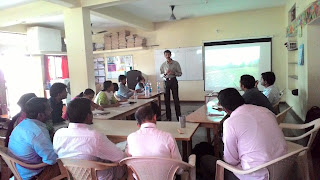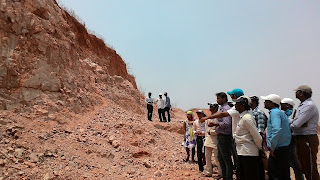Last week, I was in Yadgiri town in the state
of Karnataka attending the Hydrogeological training by Dr. Himanshu Kulkarni
from the Advanced Center for Water Resources Development and Management (ACWADAM)
for the local NGO ‘Kalike’. The training gave me the deeper insights about
Hydrogeology, which I would like to share, in an attempt to demystify the inter-relationship
between the groundwater, geology and water quality.
of Karnataka attending the Hydrogeological training by Dr. Himanshu Kulkarni
from the Advanced Center for Water Resources Development and Management (ACWADAM)
for the local NGO ‘Kalike’. The training gave me the deeper insights about
Hydrogeology, which I would like to share, in an attempt to demystify the inter-relationship
between the groundwater, geology and water quality.
 |
| Dr. Kulkarni at the training |
Since the 1960s, development of groundwater began,
which over years has started to affect the quality of Groundwater. Globally and in India, the fluoride in
groundwater is mostly due to Geogenic (contamination due to natural existing
sources in rocks, where groundwater is present) in nature.
 |
| Field Visit to understand hydro-geology |
Approximately 90% of the rural water supply in
India is sourced from groundwater. Drinking groundwater with high fluoride or arsenic has health implication and affect the quality of life. For e.g. Fluorosis is a condition that is caused by consuming high amounts of fluoride through water/food consistently over months and years.
India is sourced from groundwater. Drinking groundwater with high fluoride or arsenic has health implication and affect the quality of life. For e.g. Fluorosis is a condition that is caused by consuming high amounts of fluoride through water/food consistently over months and years.
It is not just the presence of minerals in the rocks, but the hydrogeological conditions (mentioned below) which lead to mobilization of fluoride in groundwater. In case of Fluoride for example, the major
minerals are fluorite, appatite, cryolite etc found in Granitic or
Crystalline formation rocks. To know why groundwater quality change
naturally, one must understand the factors affecting the quality.
minerals are fluorite, appatite, cryolite etc found in Granitic or
Crystalline formation rocks. To know why groundwater quality change
naturally, one must understand the factors affecting the quality.
This is where
discipline of Hydrogeology is vital. Some of the influencing factors are
discipline of Hydrogeology is vital. Some of the influencing factors are
- Rock Origin
Chemical composition of water changes after interaction
with rocks. The quality varies with level of mineralization which is based on
the type of rock to another.
with rocks. The quality varies with level of mineralization which is based on
the type of rock to another.
- Chemical Interaction
The level of chemical interaction between
groundwater and the rock depends upon the time and region. For e.g. in temperate
humid regions, the chemical content in the aquifer is low, when compared to the
arid and semi- arid regions, where the degree of mineralization is high.
groundwater and the rock depends upon the time and region. For e.g. in temperate
humid regions, the chemical content in the aquifer is low, when compared to the
arid and semi- arid regions, where the degree of mineralization is high.
- Temperature and Depth
Temperature gradually increases with increase
in the depth. This temperature change in groundwater results in increase in
solubility of most minerals. This is the reason, why water found at greater
depths is more mineralized.
in the depth. This temperature change in groundwater results in increase in
solubility of most minerals. This is the reason, why water found at greater
depths is more mineralized.
Therefore, deeper confined aquifers (your
borewells/tubewells) tend to have more chemical contamination (like
Arsenic/Fluoride/Iron/Magnesium etc.) than shallow unconfined aquifers (your
open wells/lakes).
borewells/tubewells) tend to have more chemical contamination (like
Arsenic/Fluoride/Iron/Magnesium etc.) than shallow unconfined aquifers (your
open wells/lakes).
 |
| A Open well and borewell water supply point |
Drinking Safe water is the right of every human being. According to the United Nations, “Safe” means Water with adequate Quantity, Quality, Continuity, Coverage and Cost. Though water quality is among the lesser priorities among other ‘safe’ aspects in India, it is important to consider due to its implications on human and ecosystem health. The Indian Judiciary has acknowledged this. The right to ‘pollution free water’ and the right to access to ‘safe drinking water’ has been interpreted as part of ‘Right to Life’ under Article 21 of the constitution of India.
Kiran Kumar Sen,
Wipro Sustainability Seeding Fellow
Fluoride Knowledge and Action Network
References;
Presentation on Groundwater quality, fluoride
and case studies, ACWADAM
and case studies, ACWADAM
